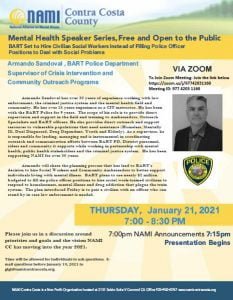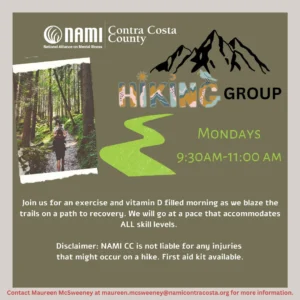By Jann La Pointe, 2024 NAMI CC Intern
Are you or a loved one in need of some support? Have you found yourself feeling isolated or alone, overwhelmed, or in need of someone to share with lately? At NAMI Contra Costa we offer a wide array of peer-led support groups that aim to create empathetic and validating communities that uplift meeting-goers and remind us all that we are not alone.
Why Support Groups are Important
We all face challenges in our lives. We deal with the grief of losing loved ones, we may deal with the difficulty of living with an unexpected health diagnosis, and sometimes just dealing with the stress of our daily lives can be overwhelming. Support groups can be helpful, by allowing us the opportunity to connect and offer each other comfort, practical advice, validation, feedback and remind us that we are not alone. According to an article from 2023 published on Mayoclinic.org, support groups can also benefit people in the following ways:
- Feeling less lonely, isolated or judged
- Reducing distress, depression, anxiety or fatigue
- Talking openly and honestly about your feelings
- Improving skills to cope with challenges
- Staying motivated to manage chronic conditions or stick to treatment plans
- Gaining a sense of empowerment, control or hope
- Improving understanding of a disease and your own experience with it
- Getting practical feedback about treatment options
- Learning about health, economic or social resources
All of our support groups at NAMI CC are peer-led, meaning that they are led by people who have lived experience, not by clinicians. There is a growing body of scientific research that shows that peer-led sessions can be helpful in reducing symptoms and developing coping skills, and according to one study, “People in groups led by peer support workers reported having a stronger connection with session leaders than those in groups led by counselors.” (Crisanti et al. 2019). In one study, published in the Lancet in 2018, peers who had been discharged from psychiatric care and received regular peer-support were 34 percent less likely to be readmitted, in comparison to their peers who did not receive this kind of support.
NAMI Contra Costa’s Support Groups
At NAMI Contra Costa we are committed to ensuring culturally relevant support to diverse communities, which is why we have groups for the LGBTQ+, African American, Latinx, and AAPI communities. We are proud to offer peer-led support groups in English, Spanish, and Mandarin, and also provide services in multiple diverse languages and have staff and interns who speak Cantonese, Portuguese, Urdu, and many other languages. We have a group for older adults as well as a strong TAY (Transitional Age Youth) program which is for folks 16 to 29 years of age. Our Tagalog language support group is currently on hold, but will be back in the future. We have several new groups forming, so make sure to keep an eye on our calendar to always see our most up to date offerings. Here is a current complete list of the peer-led groups we offer:
Meetings for Peers
NAMI Connection
NAMI Connection Recovery Support Group is a free, peer-led support group for any adult who has experienced symptoms of a mental health condition. You will gain insight from hearing the challenges and successes of others, and the groups are led by trained leaders who’ve been there. (Online and In-Person)
AAPI Mandarin Connection
Our NAMI Connection Recovery Support Group, offered in Mandarin Chinese.
Conexiones
Our NAMI Connection Recovery Support Group, offered in Spanish.
Peer Dual Diagnosis Support Group
We welcome anyone with lived experience coping with multiple diagnoses and co-occurring substance use. Discover your inner strength and empower yourself by learning from each other, sharing coping strategies, and offering encouragement and understanding.
Meetings for Family Members
Family Support Group
According to NAMI.org, “NAMI Family Support Group is a support group for family members, significant others and friends of people with mental health conditions. Groups meet weekly, every other week or monthly, depending on location. Many support groups are virtual and attendance is open to everyone across the country.”
AAPI Mandarin Family Support Group
Our Family Support Group, offered in Mandarin for those in the AAPI community who have a loved one with a mental health condition.
African-American Family Support Group
Our Family Support Group, offered for those in the African American community.
Grupo de Apoyo Familiar Español
Our Family Support Group, offered in Spanish for the Latinx community.
TAY (Transitional Age Youth) Meetings
TAY (Transitional Age Youth Support Group)
This group provides a safe, confidential, and free support space for any young adult between the ages of 16 and 29 who is living with or has been affected by mental illness. This support group encourages healthy coping mechanisms, mindset reframing strategies, and self-acceptance(online and in-person meetings available).
AAPI TAY Mandarin Support Group
Our TAY Support Group, offered in Mandarin for members of the AAPI community.
African American Young Women’s Group
Welcoming all African American (AA) women from ages 17-29 including young mothers, graduates, any young women who would like to give and receive support from other young women in a judgment-free environment!
Mixed/General Meetings
LGBTQ+ Support Group
A free, confidential and culturally inclusive support group for LGBTQ+ individuals, families and allies of all ages.
Faith-Focused Grief/Faith and Prayer Support Group
Join our African American-led support group to learn how to deal with grief, mental health, and other issues through spiritual tools and practices of faith. Though focused on African American spirituality and faith practices, non-African American attendees will not be excluded.
Men’s Support Group
A safe, open, and respectful environment for generations of men to convene.
Men of Wellness & Men of Faith
A meeting led by men, for men, designed to help each other get through hard times. According to one of the meeting’s facilitators, Pastor Alfonzo Edwards, “We all need a little help, whether it be spiritual, physical or mental. Don’t be ashamed to reach out for help.”
Older Adults Support Group
In this group members share personal experiences, offer emotional comfort, and provide practical advice to other members.
Young Adult Support Group
Join our African American young adult-led support group! We provide emotional support, an opportunity to share your story, advice (on school, work, mental health, religion, and etc.), coping skills, discussion, and a space to build relationships/connections for young adults ages 18-32. Though the group is catered to and focused on the African American community, all are welcome to join.
Writer’s Support Group
The NAMI CC Writers’ Group is open to peers, family members, and anyone interested in conveying their experience and perspective through the craft of writing. Participants have the opportunity to prepare pieces before group and do exercises during group, sharing poetry, short stories, personal narratives, etc.
How to Find Support Groups at NAMI Contra Costa
There are several ways to find a support group at NAMI Contra Costa. On our website, namicontracosta.org, you can visit our calendar to see what groups are happening on which day, who the facilitators are, and what time they are happening. Here you can find a full set of our groups, both the online and in-person options. At the moment we offer the following three in-person meetings; LGBTQ+ Support Group (hybrid), Connection, and TAY Support Group. It is possible to connect to our Zoom meetings directly from the online calendar by using the Zoom link or meeting code and password.
You can browse our meetings and read descriptions of each one on our site by visiting the “Zoom Meetings” page, which is updated weekly. In an effort to help people find the groups that they most identify with, at the top of this page there are tabs that can be clicked on to filter the list down to what they’re specifically looking for. At the top of the page there are buttons that, if clicked, will take you to pages with listings for the following culturally-specific groups; African-American, AAPI, or Latinx. Below those buttons there are also tabs to narrow the list of all our groups to those specifically geared to the following groups; “Family”, “Peer”, or “Mixed/General groups”. By organizing our support groups by category and updating our offerings weekly, we can ensure that users have the most up-to-date and easily searchable information possible.
Another way to find out about our support meetings is to contact us directly by email, gro.atsocartnociman@noitpecer or by telephone at (925) 942-0767. We can email you a resource list with all of our support meetings on it and can answer any of your questions regarding which group might be a good fit for you.
Lastly, if you’re in the area, you are welcome to stop by our office at 2151 Salvio Street, Suite V, near Todos Santos Plaza in Concord. Whoever is at the reception desk will be able to answer your questions and also give you flyers with information regarding our different groups.
Other Support Groups and Resources
Besides NAMI CC, there are many organizations within Contra Costa County that offer peer-support. On our website, you can find more community resources including a Family Support Group in Brentwood and information on Peer Connections, formerly known as Putnam Clubhouse.
And finally, here are some links to other Support Groups in our Community:
- Grief Counseling & Bereavement Support – Contra Costa Crisis Center
- Al-Anon
- Alcoholics Anonymous
- Rainbow Community Center’s Support Groups: for LGBTQIA2S+ people & allies
Conclusion
The need for connection is something that all human beings have in common. American researcher and storyteller, Brené Brown says, “Connection is the energy that exists between people when they feel seen, heard, and valued; when they can give and receive without judgment; and when they derive sustenance and strength from the relationship.” The existential psychiatrist and expert in group therapy Irvin D. Yalom gives us an idea of how connection may be healing when he posits that, “…the act of revealing oneself fully to another and still being accepted may be the major vehicle of therapeutic help.” At its core, the support group is a place where we can find the connection that we crave as humans, and if we give it a try, we just might find that the simple act of connecting with others, can help us to heal.


